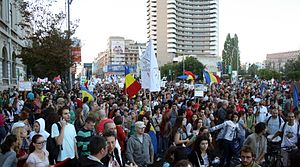2013 Romanian protests against the Roșia Montană Project
| 2013 Romanian protests against the Roșia Montană Project | |||
|---|---|---|---|
| Part of 2012–14 unrest in Romania | |||
 |
|||
| Date | 1 September 2013–11 February 2014 (5 months, 10 days,) |
||
| Location |
|
||
| Caused by |
|
||
| Goals |
|
||
| Methods | |||
| Concessions given |
|
||
| Number | |||
|
|||
| Casualties | |||
|
|||
The 2013 Romanian protests against the Roșia Montană Project were a series of protests in Bucharest, Cluj-Napoca and dozens of other cities in Romania and abroad against the Roșia Montană mining project. The protesters say that the mining project would destroy the environment and heritage of Roșia Montană and demand the withdrawal of a law which would enable this project to commence. In Bucharest, protests are held every evening in the University Square and marches are held each Sunday.
Although at first largely ignored by the world press, the demonstrations are starting to receive more significant worldwide attention both by the media and the general population via the use of social networks. The protests were dubbed by Romanian press and not only Indignants Movement (Romanian: Mișcarea Indignaților) and Romanian Autumn (Romanian: Toamna Românească).
The Roșia Montană Project was initiated by Roșia Montană Gold Corporation, a company of which the largest shareholder is the Canada-based Gabriel Resources. The company was given in 2000, without bidding, a license for mining gold. The open-pit mining project will use cyanide to extract gold and it is expected to require the razing of three villages and destroying four mountain tops. If approved, it would be Europe's largest open-pit gold mine and it will use 12,000 tonnes of cyanide yearly, giving a yield of 350 tonnes of gold and 1,500 tonnes of silver.
The Roșia Montană campaign was originally organized by locals of Roșia Montană who have refused to be relocated and have been battling the corporation for years in the courts. The activists claim that the project would cause an environmental disaster, that it would destroy the ancient Roman archeological sites and that the project involved handling assets to the Canadian company, while the Romanian state would earn only 6% out of the project.
Within the last 14 years, the company was not able to obtain all the needed permits due to failure to comply with the Romanian environment laws. The ruling Social Democrats made a campaign promise before the 2012 legislative elections to stop the project, but they changed their mind after winning the elections In order for the project to continue, the Romanian government approved a new draft law in late August 2013 and forwarded it to the Parliament which had to vote on it in September.
...
Wikipedia
